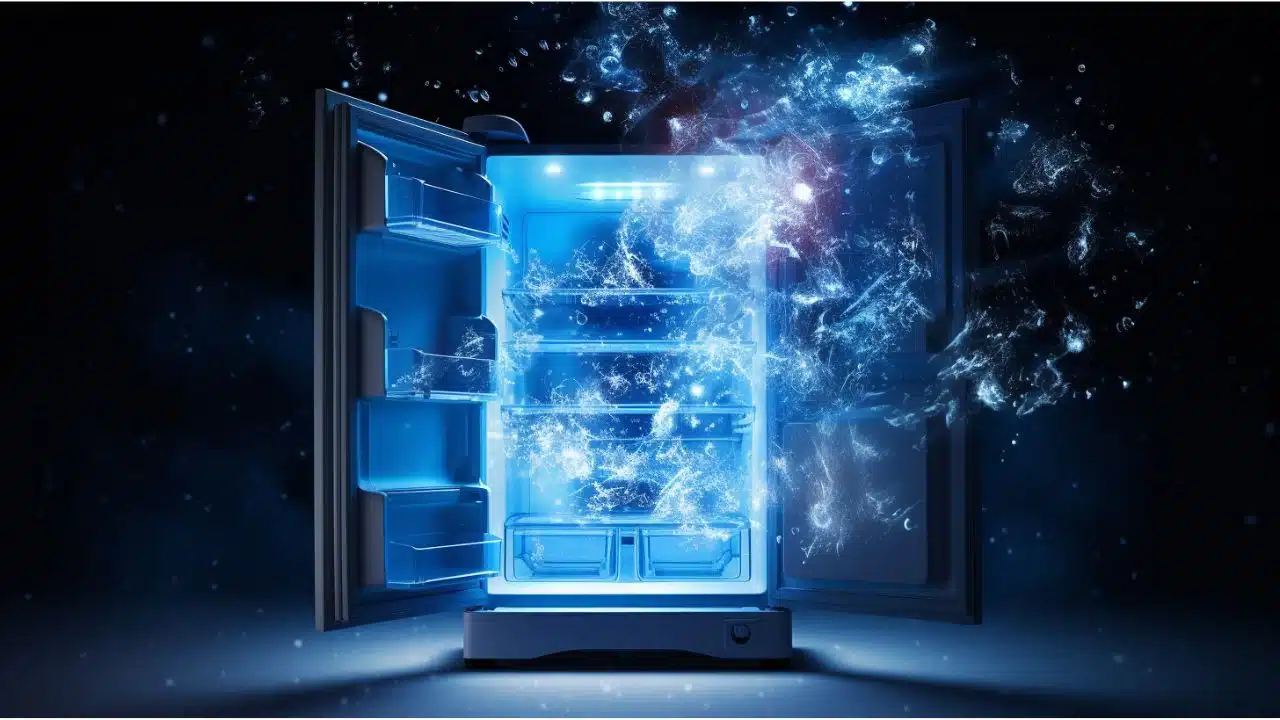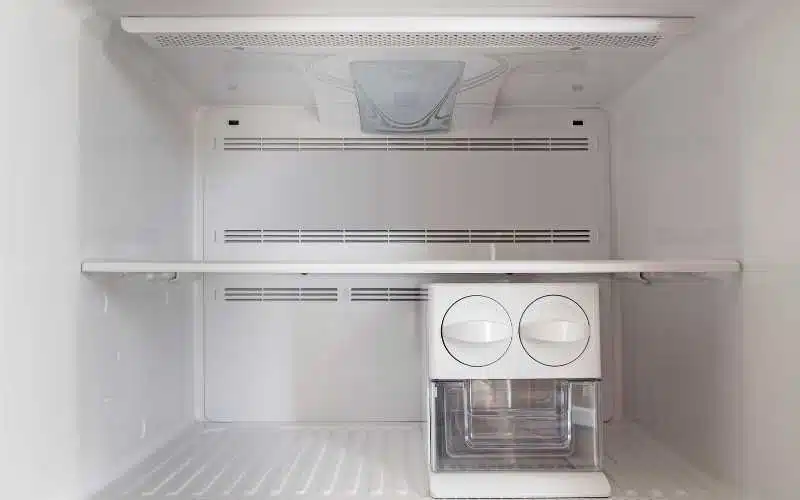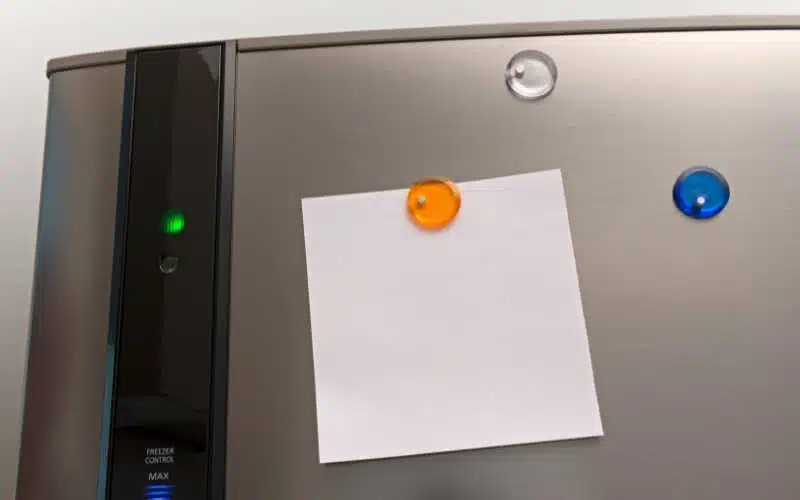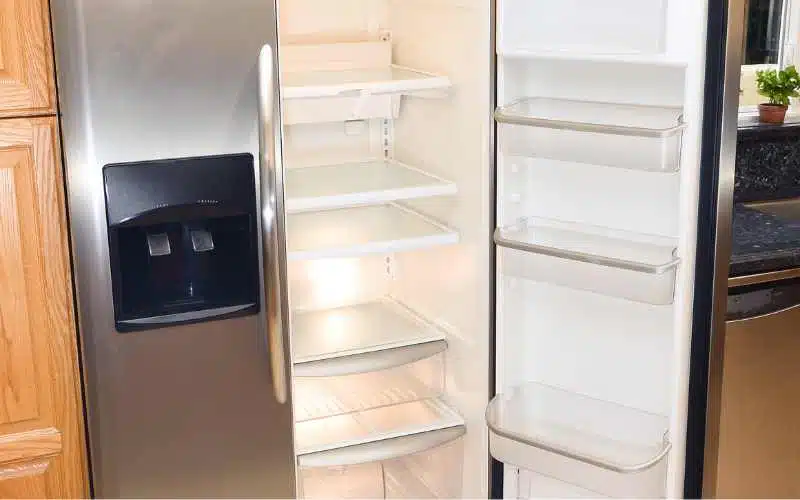Hearing sounds from your Samsung fridge might be alarming. Because you will be concerned that foods that ought to be frozen might be at risk of going wrong, and that is a loss on your part.
However, there should be no reason to panic. Most devices tend to make one sound or the other to show that they are working perfectly.
Consequently, you will discover if it is okay for your Samsung fridge to make such sounds.
Samsung fridge making vibrating noise is relatively standard and is an indication that there is power. On the other hand, if there is a knocking or clicking sound, it indicates that there is a problem somewhere. Even so, if the vibration becomes too loud, a part of the fridge is faulty and needs replacement.
In this article, you will understand why a Samsung fridge will make a vibrating, clicking, or knocking noise.
In the end, you can fix the problem and maximize the usage of your fridge.
Why Is My Samsung Fridge Making Vibrating Noise?

Samsung fridges usually make a vibration sound or low hum to signify that it is working. Although the sounds vary in models and brands, they are always present.
So, when your fridge makes a low vibration, you have nothing to worry about. The condenser fan motor is responsible for this vibration.
If the condenser fan goes terribly, the vibration sounds increase, which might be a problem. Also, if the condenser fan comes in contact with the fridge panel, it will result in a sound.
Sleeping with such a sound would be uncomfortable, especially if your room is close to the kitchen.
Aside from sleeping, an unusual sound from your fridge is somewhat unnerving. For instance, trying to meditate will prove futile with such a disturbing sound.
Also, the ice maker is responsible for some vibration in the fridge. So it would be weird to expect your fridge to be completely silent.
So, if you have a fridge, embrace the low vibration as your fridge assures you that it is sound.
How Do I Fix a Samsung Fridge that Is Making Vibrating Noises?
Fixing a Samsung fridge that makes vibrating noise is relatively easy. However, it would help if you remembered that it is normal for a Samsung fridge to hum quietly.
So, you can only think of fixing it if the sound interferes with your daily activities. For unusual vibrating noises, you must first ascertain the cause of the problem.
I will list a few possible causes of unusual vibrating noises that your Samsung fridge might make.
Here are the causes of vibrating noises from your Samsung fridge.
- Condenser fan touching the fridge panel
- Ice maker problem
- Lousy compressor motor
Since we know the problems, the next thing is to find a solution.
Here are the ways to fix a Samsung fridge that is making vibrating noises.
#1. How to Fix the Condenser Fan Touching the Fridge Panel?
The condenser fan is crucial for your Samsung fridge to always stay calm. Samsung fridges have an ice maker, which helps preserve the ice cubes in the tray.
However, if the fan has a buildup of ice, it will begin to make some noise. These sounds will result from the fan contacting the ice maker component.
So, to fix this problem, follow the following steps.
- Disconnect the fridge from power and turn off the circuit breaker.
- Open the door and remove the ice maker cover.
- Take out the tray and let the ice melt before adding pressure.
- Locate the fan and remove chunks of ice as soon as the temperature rises.
- However, if the fan is no longer in alignment, you should fix it.
- Carefully add pressure to the fan to put it back in place.
- However, you should call a Samsung technician for support if you cannot do that. After all, they have excellent customer service and are keen on pleasing their customers.
To avoid this problem in the future, ensure to turn off your Samsung fridge as soon as it gets frozen. Also, refrain from continually letting your Samsung fridge run with nothing inside.
This action damages the fridge; you can hear sounds from ice chunks falling on the glass.
#2. How to Fix the Ice Maker?
The ice maker helps to produce ice cubes and functions in its compartment. However, if it has a problem, it could result in a vibrating noise.
If you notice the vibration, you must first check if the ice maker is frozen. If it is, proceed to melt the ice to ascertain the problem.
Using a hand dryer will help, especially if you are trying to save time. However, you must ensure that the heat is not direct, as it could damage the panel.
Sometimes, all your Samsung fridge wants is the luxury of defrosting and beginning its cycle again.
#3. How to Fix a Bad Compressor Motor?
The compressor is crucial in the fridge cooling system. If it becomes faulty, it results in a series of problems like fridge cooling partially or not at all.
Consequently, you must fix it when it becomes inactive or begins to make funny noises. If you don’t fix it on time, you may have to replace the compressor motor, which can cost a lot.
Sometimes, the fan starts hitting the fridge panel. This action makes an unusual sound. It will help if you fix the problem to get everything running.
Here are the steps to fixing a bad Samsung fridge compressor.
- First, turn off the fridge and unplug it from the socket to avoid electrocution.
- Next, unscrew the panel at the base of the fridge to access the compressor.
- Afterward, turn on the refrigerator to measure the compressor voltage via the control panel.
- For this, you would need a tester. This tool will help you measure the current from the control panel.
- Loosen the screws holding the control board, remove them, and place them on the floor.
- Unscrew the top cover and open it to access the panel.
- Place the tester points in a neutral and positive port, then check the reading. If the voltage is okay, then you have no problem.
- But if it is too low, you must proceed to replace the control board. You can fix it by removing all the wires from the board and attaching them to the new one.
- However, ensure that you turn off the refrigerator for this step. This action protects you from electric shock.
Why Is My Samsung Fridge Making Clicking Noises?
Clicking noise from your Samsung fridge is usually expected if it is minimal. However, it becomes a problem if it gets loud and unbearable.
The sound may indicate that the ventilation fans are insufficient or the compressor coil is defrosting.
Here are a few detailed reasons why your Samsung fridge makes clicking noises.
- Bad ventilation fan
- Malfunction compressor coils
- Faulty compressor start relay
- Problematic ice maker
- An outdated fridge
#1. Bad Ventilation Fan
The ventilation fan allows the fridge to circulate air within its compartments.
Aside from the compressor that generates cold air, the fans are necessary to keep food items cool during a defrost cycle.
Unfortunately, if the fan goes wrong, you may begin to hear a clicking sound as it hits the other parts.
Leaving a prolonged defrost cycle is a common cause of ice buildup that is bad for the fridge.
#2. Malfunctioning Compressor Coils
If the compressor coils are dirty, you must do some cleaning. The condenser coil will click if you still need to clean it.
Unfortunately, most of us need to realize that fridge parts require our attention.
As long as ice keeps coming and foods do not rot, there is nothing to worry about. But, unfortunately, this is not the case, as you have to be conscious of the not-so-obvious parts too.
Later in this article, I will show you how to clean your Samsung fridge condenser coils to avoid clicking noises.
#3. Faulty Compressor Start Relay
Most times, all familiar and unusual sounds come from the compressor. So, do not get uncomfortable if all the fridge problems are due to the compressor.
The reason is that the compressor relay is a crucial part of the fridge’s function. Consequently, it is an indispensable part you must pay attention to as it is prone to damage.
#4. Problematic Ice Maker
The ice maker is the most active section of the fridge. Its function requires turning water into ice cubes for chilling drinks and foods.
However, you might hear a clicking sound as your ice maker dispenses ice into your cup. On the other hand, a lousy ice maker usually indicates a more significant problem.
For example, if the fan is wrong or out of place. These things go a long way in the ice maker’s normal function.
#5. An Old Samsung Fridge
The older your refrigerator gets, the more likely it becomes a burden to you. The reason is that the parts get weaker over time and are susceptible to faults and problems.
Another reason could be that the refrigerator model is outdated and needs an upgrade. Samsung makes it easy for you to stay updated on the latest technology.
Consequently, upgrading your refrigerator every 10-15 years would be best. This action reduces your chances of experiencing unnecessary problems in the future.
Aside from changing the entire fridge, it would help if you change the parts prone to damage—for example, the water filter, compressor fan, or ice maker.
How Do I Fix a Samsung Fridge that is Making Clicking Noises?
Since we made a list of the possible problems causing a Samsung fridge to make clicking noises, it would be best to find solutions.
According to each of the listed problems above, here are the possible ways to clear them. Also, I will only share solutions to problems I have not listed.
As you can see, some of the problems are similar to both vibrational and clicking sounds.
Here are the ways to fix a Samsung fridge that is making clicking noises.
#1. How to Clean a Condenser Coil?
For a condenser coil, follow these steps:
- Accessing the condenser coil is relatively easy, either at the back of the fridge panel or beneath.
- Remove the panel and use a damp cloth to clean dust and debris from the coils.
- However, ensure that you squeeze the rag very well before cleaning. The coils only require mild cleaning and do not need so much water.
- Afterward, leave the coil to air dry before replacing the panel. This procedure should fix the problem.
#2. How to Fix an Old Fridge?
You can do this by replacing the old model with a newer one. This action saves you the stress of managing a substandard fridge with compiling problems.
However, this step is necessary when you have tried other options, and the sound continues. In addition, it will help if you make it a habit to replace appliances before expiration.
Why Is My Samsung Fridge Making Knocking Noises?
Your Samsung fridge will make a knocking noise if there is a loose pipe or a problem with the ice maker.
Also, the temperature change can cause a contraction and expansion of the plastic compartments. These movements will result in knock-like sounds that may be disturbing.
Unfortunately, these problems are unavoidable as long as your Samsung fridge keeps working. But first, you must employ correct maintenance methods to curb their excesses.
How Do I Fix a Samsung Fridge that Is Making Knocking Noises?
Fixing a Samsung fridge that makes knocking sounds requires finding the problem. If it is the loose water pipes, you must replace them or repair them.
How to Repair the Loose Water Pipes?
You can repair loose water pipes in the following steps.
- Check the back of the fridge for the pipes that supply water to the dispenser.
- Feel the pipes for any loose parts, especially with an indication of leaking water.
- Tighten the pipes if they are loose and check for the knocking noise. After you do this, it should eliminate any sounds.
Let us consider a table showing the differences between a Samsung fridge’s vibrational, knocking, and clicking sounds.
Below is a table that shows the information.
| Vibrational | Clicking | Knocking |
|---|---|---|
| This sound is normal | It may be due to a problem | It indicates a problem |
| It is not loud or disturbing | It may be uncomfortable | It requires immediate attention |





